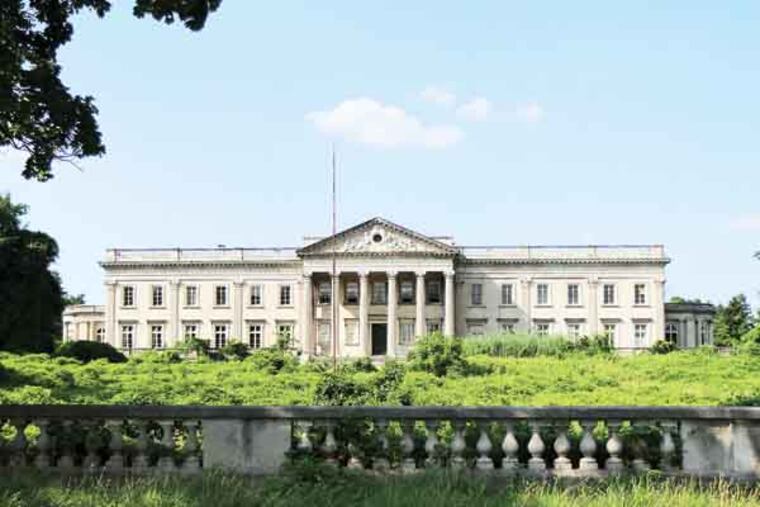'Last hope' for pastor's grand estate
He looks to U.S. justices after long battle with Cheltenham.

Seventeen years ago, Richard S. Yoon, pastor of the First Korean Church of New York, took over the storied Lynnewood Hall mansion in Elkins Park.
The Gilded Age grand dame, created by society architect Horace Trumbauer for the Widener family, held special meaning for Yoon. He graduated from the Faith Theological Seminary, which used to operate at the site, but ran into financial problems and moved out in the 1990s.
Yoon, a former seminary director, acquired the 34-acre property and 110-room mansion at a sheriff's sale in 1996.
But his goal of operating a branch of his New York congregation at Lynnewood Hall has faced one roadblock after another.
Yoon said he was running out of options. Unless the U.S. Supreme Court takes up a petition he filed in May, he said in an interview, he may have no choice but to sell the aging estate.
"This is the last hope," Yoon said Friday. "We have been fighting for almost 20 years."
At the root of his legal faceoff with Cheltenham Township is the use of Lynnewood Hall as a church.
In 1998, the township rejected his request for a zoning variance to operate a church in the residential neighborhood. Five years later, it went even further and eliminated any exceptions to the zoning law for schools or churches.
Yoon has battled the decision in state and federal court, losing every round, including a federal appeal in February.
In his petition to the Supreme Court, Yoon argues that he is being denied his civil right to use the land as a church. The high court is likely to decide whether to take up the matter in the fall, Yoon said.
"We have to wait on the Supreme Court," Yoon said. If the court passes on the case, "we will have no choice but to sell it or take some other way to dispose of the property."
Sheriff's sale
Yoon, in addition to running the First Korean Church in Forest Hills, N.Y., is a urological surgeon. A former chancellor of the Faith Theological Seminary, Yoon had lent the struggling school $2.2 million. When the operators could not pay him back, he acquired title at a sheriff's sale.
On Sundays, Yoon drives down from New York to hold afternoon services inside the grand library of the former estate of the Widener family. It's one of the few rooms in the sprawling mansion that is continuously used. When he took over the estate, about 100 people attended services. Today, the number is down to about 20.
Yoon pays $138,258 a year in taxes, including county, township, sewer, and school fees. He said that cost was a financial burden.
"Our financial situation is very bad," Yoon said.
Yoon keeps the gates of Lynnewood Hall locked. A caretaker lives on the property. The sprawling grounds, which at one time rivaled anything in Europe, lost their manicured gentility many years ago.
What once was
Yoon said the main mansion is "sound," but most of his investment in the property has gone toward maintaining the "status quo" with repairs, rather than undertaking any major renovations.
Harvey Portner, a township commissioner who represents the area including Lynnewood Hall, said that over the years, many developers have expressed an interest in property.
"It can be and should be developed into something magnificent," he said.
In its heyday, this corner of Elkins Park was one of the richest addresses in the country. Two other Gilded Age estates - the two-mansion Elkins Estate and Temple University's former Tyler School of Art - also are in a state of flux.
Temple recently has hired a commercial broker - SSH Real Estate - to market the former Tyler campus, which has been vacant for three years.
The Elkins Estate, meanwhile, has reverted to the control of the Dominican Sisters of St. Catherine de Ricci. The congregation is in conversations about selling the property with "a number of interested parties," said Sister Anne Lythgoe, special projects director for the Dominican Sisters.
"I am very optimistic that the discussions taking place will result in a sale that will benefit both the congregation and Cheltenham Township," she said.
Cheltenham Township has few commercial tenants. Between 15 and 20 percent of the property is tax-exempt.
Brad Pransky, president of the Cheltenham Township Community Development Corp., an economic development nonprofit, said there was a "wide range" of interest in finding new uses for the old mansions.
"We have to look at the kind of development that will improve the tax base," Pransky said. Lynnewood Hall, he said, "could become a viable asset."